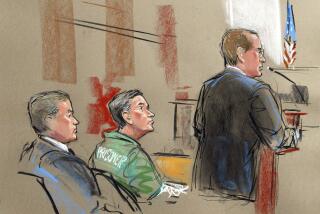U.S. Seeks to Avoid Spy Rift With Russia : Espionage: Intelligence sources blame CIA suspect for the deaths of at least two agents. White House calls for Moscow to cooperate with probe.
- Share via
WASHINGTON — The Clinton Administration sought Wednesday to keep U.S.-Russian relations from suffering a major setback, even as intelligence sources blamed the deaths of at least two agents and possibly many more on the CIA official accused of spying for the Kremlin.
Faced with congressional calls for an immediate suspension of Russian aid, the White House warned of diplomatic reprisals unless Moscow ceases its espionage activities in the United States and cooperates with efforts to assess the damage investigators believe was done to U.S. intelligence by Aldrich Hazen Ames.
Ames, former head of the CIA’s Soviet counterintelligence division, and his wife were arrested on espionage charges Monday. The government contends that since 1985 they traded intelligence secrets first to the Soviets and then to the Russian Federation for payments totaling $1.5 million.
“This is a very serious case and it has to be pursued aggressively and we will do that,” President Clinton told reporters at the White House.
On Capitol Hill, the chairman of the Senate Intelligence Committee, Sen. Dennis DeConcini (D-Ariz.), said the damage inflicted on the CIA’s intelligence-gathering operations in the former Soviet Union had been enormous during the nine years that Aldrich is alleged to have been a Kremlin “mole.”
“I’m assuming some executions occurred,” DeConcini said, refusing to elaborate.
Former intelligence officials told The Times that at least two CIA agents, both Russians, were executed after being caught while Ames was providing Moscow with information about the CIA’s intelligence-gathering abilities in the former Soviet Union.
One senior CIA official, now retired, said the agents were captured in 1991 as a result of information supplied by Ames. Another senior intelligence official confirmed the deaths but said it was unclear whether they were the result of Ames’ alleged betrayal.
According to some accounts, the number of executions may have been as high as 10, although not all may ever be linked to Ames.
DeConcini led a chorus of congressional calls Wednesday for temporarily freezing aid to Russia as a means of persuading Moscow to disclose to U.S. officials the information allegedly supplied by Ames. Officials said that Ames, who remains in federal custody, is refusing to cooperate.
“My guess is the Russians will respond positively and cooperate” if threatened with a suspension of their share of the $2.5 billion in economic assistance that Congress appropriated for the former Soviet republics last year, DeConcini said.
Although warning of possible reprisals, Clinton and other senior Administration officials took pains Wednesday to try to contain the scandal, warning that anger over it must not be allowed to throw U.S.-Russian relations back into a Cold War-style freeze.
Clinton stressed that America’s strategic interests still are best served by encouraging Russian President Boris N. Yeltsin’s democratic reforms. He said he would wait for Moscow’s response before deciding on a next step.
Clearly concerned about the possible backlash on Capitol Hill, other Administration officials sought to portray the scandal as something of an aberration in U.S.-Russian relations.
“We have to move forward into the future with our eyes wide open and we have to note the extent to which this is a story whose origins are in the past,” Vice President Al Gore said in a speech to the U.S.-Russia Business Council.
Administration officials said privately that Clinton, a strong supporter of Yeltsin, has asked the Russian leader to ease the pressure for retaliation by helping with the damage assessment and by recalling the two Russian Embassy officials who were believed to be Ames’ control officers.
“If they don’t take action, we will,” White House spokeswoman Dee Dee Myers said.
Testifying before the Senate Foreign Relations Committee, Secretary of State Warren Christopher said the extent of damage to the U.S.-Russian relationship “will depend on Russian actions in the days ahead.”
He declined to be more specific. But a number of senators said more than just the recall of diplomats or expressions of outrage will be needed to cool congressional anger.
“It’s safe to say the future of aid to Russia, supported on a bipartisan basis last year, is now seriously in question,” said Sen. Mitch McConnell (R-Ky.), ranking Republican on the subcommittee that determines foreign aid levels.
Siding with the Administration, Sen. Patrick J. Leahy (D-Vt.), chairman of the Appropriations Committee’s subcommittee on foreign operations, said he hopes that members of Congress will not “lose sight of where our strategic interests lie and what must be done to serve them” when the 1995 aid package is debated later this year.
Times staff writers Ronald J. Ostrow, David Lauter and Doyle McManus contributed to this story.
More to Read
Sign up for Essential California
The most important California stories and recommendations in your inbox every morning.
You may occasionally receive promotional content from the Los Angeles Times.













